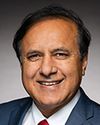Can I just...? I'll stop your time.
I don't know if that really answered the question. It was valuable information, but I think what Mr. Ali was asking about—and correct me if I'm wrong—is the evolution of Canada's position on the international human right to water, because for a while, it didn't recognize that right at the UN but then changed its position, and so on.
However, I understand that you might not have that information on hand, so I would ask that the department submit a briefing note on the evolution of Canada's position on this issue and the reasons that it changed at one point. I would just request that this information be submitted in writing.
You made an interesting point about how ensuring that the human right to water, or water security, dovetails with Canada's feminist foreign policy. That's why I've always thought that if we could create a foreign policy pillar for water, it would be very consistent with the feminist component in our global foreign policy.
I'm sorry to interrupt. I couldn't help myself, Mr. Ali, but I didn't take any time away from you.



